The 52nd EBES Conference – Istanbul takes place on July 3rd, 4th, and 5th, 2025 in Istanbul, Türkiye. Event & Program Link. Highlights of the conference include:
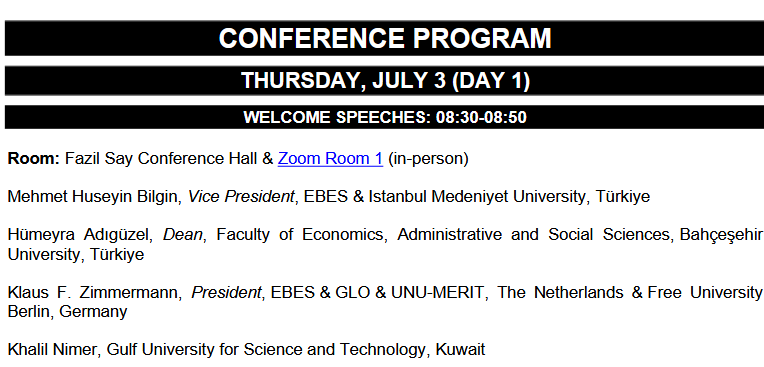
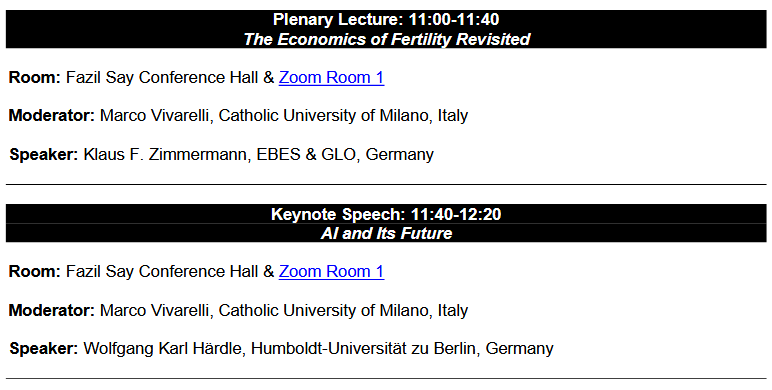


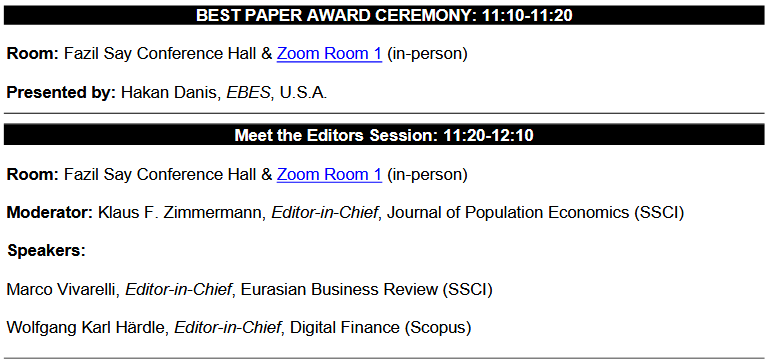
Ends;


The 52nd EBES Conference – Istanbul takes place on July 3rd, 4th, and 5th, 2025 in Istanbul, Türkiye. Event & Program Link. Highlights of the conference include:





Ends;

The 8th IESR-GLO joint workshop on “Fertility decline and family policies” takes place on July 10-11, 2025, in Jinan University, Guangzhou, China. It is organized in co-operation with the Journal of Population Economics. Attendence is on invitation only.

Day 1, July 10
12:00-13:30 PM Lunch
13:30-13:45 PM Welcome
Journal of Population Economics (JOPE) & IESR-GLO Collaboration
Shuaizhang Feng, Jinan University and GLO, JOPE Editor
Klaus F. Zimmermann, UNU-MERIT and GLO, JOPE Editor-in-Chief
Session I
Chair: Shuaizhang Feng
13:45-14:30 PM
Title: The Economics of Fertility Decline
Author(s): Klaus F. Zimmermann (Free University Berlin & GLO)
14:30-15:15 PM
Title: Migration Reform and Fertility: Causal Evidence from Rural China
Author(s): Zhangfeng Jin (Zhejiang University of Technology & GLO)
Wenchao Jin
15:15-15:45 Group Photo & Break
15:45-16:30 PM
Title: Catholic Missionary Presence and Fertility in India
Author(s): Shampa Bhattacharjee (Shiv Nadar Institution of Eminence)
Roopal Jain & Priyoma Mustafi
16:30-17:15 PM
Title: Climate Change and Migration across the Great Wall of China during the Little Ice Age
Author(s): Qing Pei (Education University of Hong Kong & GLO)
18:30-20:30 PM Dinner (By invitation)
Day 2, July 11
Session II
Chair: Klaus F. Zimmermann
9:00-9:45 AM
Title: Background Risk and Fertility
Author(s): Massimiliano Tani Bertuol (School of Business, UNSW, & GLO)
9:45-10:30 AM
Title: Sex Ratio, Commitment and Power Distribution Within the Household: An Empirical Investigation of China’s One Child Policy
Author(s): Xiao Liu (Capital University of Economics and Business)
10:30-11:00 AM Break
11:00-11:45 AM
Title: Family Planning Policy and Intimate Partner Violence
Author(s): Rufei Guo (Wuhan University and GLO)
11:45-12:30 PM
Title: Automation and Fertility Transitions in China
Author(s): Yue Wang (Peking University and GLO)
Chen Kang (Tongji University) & Xiaobing Wang (Peking University)
12:30-14:00 PM Lunch
RELATED:
– Seventh Renmin University & GLO Annual Conference 2024 on Low Fertility & Population Aging. In collaboration with the Journal of Population Economics. LINK
– Hart, R.K., Bergsvik, J., Fauske, A., Kim, W. (2024). Causal Analysis of Policy Effects on Fertility. In: Zimmermann, K.F. (ed.) Handbook of Labor, Human Resources and Population Economics. Springer, Cham. https://doi.org/10.1007/978-3-319-57365-6_451-1
– CALL FOR PAPERS: Collection Understanding Fertility Decline of the Journal of Population Economics. Details. See more related papers there.
– Costanzo, C. Robots, jobs, and optimal fertility timing. Journal of Population Economics 38, 51 (2025). https://doi.org/10.1007/s00148-025-01105-3. Free to read: https://rdcu.be/eubHU
– Huang, W., Wang, Y., Wu, H. et al. The motherhood penalty and low fertility in China: a pseudo-event study. Journal of Population Economics 38, 28 (2025). https://doi.org/10.1007/s00148-025-01078-3. Free to read: https://rdcu.be/eubJs
– Li, H., Shi, X. The effect of the one-child policy on fertility in China: identification based on difference-in-differences. Journal of Population Economics 38, 2 (2025). https://doi.org/10.1007/s00148-025-01061-y. Free to read: https://rdcu.be/eubJ4
– Luo, W., Zou, X. Demographic impacts of China’s trade liberalization: marriage, spousal quality, and fertility. Journal of Population Economics 37, 63 (2024). https://doi.org/10.1007/s00148-024-01040-9. Free to read. https://rdcu.be/eubKD

New research from the GLO network free to access:
Seven discussion papers from June 2025 on social origins, healthcare utilization of refugees, education and earnings, indirect taxation and in-kind benefits in the EU, life satisfaction in Eastern Europe, smog and suicidal ideation among kids in school, policy threats and gains for recipients.







1623 Social Origins and Field of Study– Download PDF
by Scervini, Francesco & Volponi, Laura
1622 The Effect of Initial Location Assignment on Healthcare Utilization of Refugees – Download PDF
by Kulshreshtha, Shobhit
1621 Education and Earnings in Arkansas – Download PDF
by Patrinos, Harry Anthony & Rivera, Angelica
1620 Net Fiscal Contributions in the EU – The role of indirect taxation and in-kind benefits – Download PDF
by Christl, Michael & Köppl-Turyna, Monika
1619 Are We Happy Yet? Revisiting Life Satisfaction in Eastern Europe – Download PDF
by Mladjan, Mrdjan & Nikolova, Elena
1618 Blowin’ in the Wind: Smog and Suicidal Ideation among School-Age Children – Download PDF
by Zhang, Xin & Chen, Xi & Sun, Hong & Yang, Yuanjian
1617 DACA’s Uncertain Path: How Policy Threats Reshape Economic and Social Gains for Recipients – Download PDF
by Amuedo-Dorantes, Catalina & Wang, Chunbei
Ends;
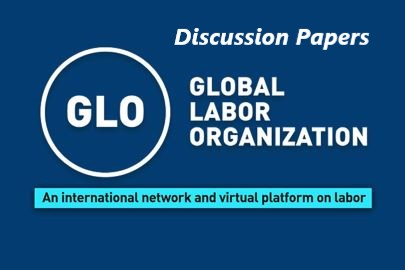
New research from the GLO network free to access:
Eleven discussion papers from May 2025 on state dependence in social assistance, workweek reform, Mariel Boatlift and women, wellbeing and compliance, unlocking global markets, monetary roots of exploitation, abortion policies and fertility, community-living older persons, physician-patient gender match, work permits in Colombia, and nudging eyeglass use among children.





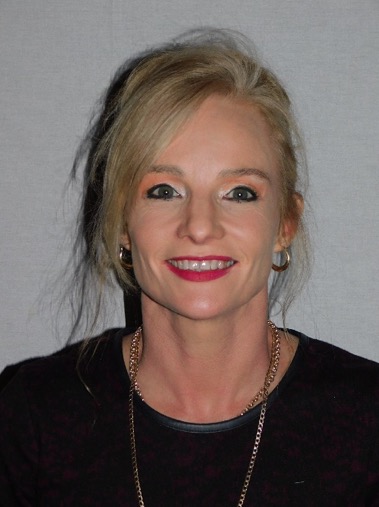





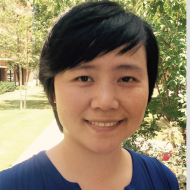
1615 Structural State Dependence in Social Assistance through the Lens of Couples’ Ethnic Composition. Evidence from Swedish Panel Data – Download PDF
by Andrén, Daniela & Andrén, Thomas & Kahanec, Martin
1614 Working 37.5 hours per week: Who Truly Gains from Spain’s new Workweek reform? – Download PDF
by Narazani, Edlira
1613 Evaluating the Impact of the Mariel Boatlift on Women’s Labor Market Outcomes: A Synthetic Difference-in-Differences Analysis – Download PDF
by Wang, Yifan & Wang, Chunbei & Holmes, Chanita
1612 Experienced well-being and compliance behaviour: new applications of Quality of Life theories, using AI and real-time data – Download PDF
by Rossouw, Stephanié & Greyling, Talita
1611 Unlocking Global Markets: The Impact of International Standards Certification on Pakistani Firms’ Export Performance – Download PDF
by Wadho, Waqar & Chaudhry, Azam
1610 An Essay on the Monetary Roots of Exploitation – Download PDF
by Andini, Corrado
1609 The Effect of Abortion Policies on Fertility and Human Capital in Sub-Saharan Africa – Download PDF
by Dimico, Arcangelo
1608 Absence of Care Among Community-Living Older Persons with Dementia and Disabilities: A Cross-National Analysis of Population Survey from 22 Countries – Download PDF
by Lin, Zhuoer & Qian, Yuting & Gill, Thomas M. & Hou, Xiaohui & Allore, Heather & Chen, Shanquan & Chen, Xi
1607 The Impact of Physician-Patient Gender Match on Healthcare Quality: An Experiment in China – Download PDF
by Si, Yafei & Chen, Gang & Zhou, Zhongliang & Yip, Winnie & Chen, Xi
1606 From Exodus to Employment: Labor Market Transitions and the Role of Work Permits in Colombia – Download PDF
by García-Suaza, Andres & Mondragón-Mayo, Angie & Sarango-Iturralde, Alexander
1605 Nudging Eyeglass Use Among Children: Evidence from a Randomized Controlled Trial in Vietnam – Download PDF
by Cuong Viet Nguyen & Quynh Thien Thi Pham & Tung Duc Phung
Ends;
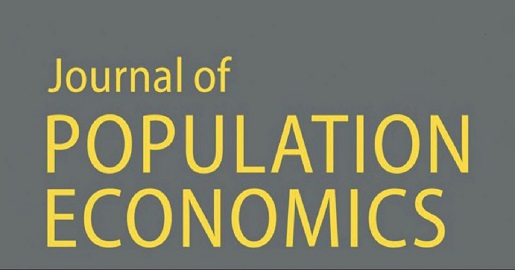
As of June 2025, the CiteScore 2024 (Scopus) numbers are out. In this ranking system, the Journal of Population Economics (JOPE) has stabilized and strengthened its leading position as a top field journal.
CiteScore 2024 counts the citations received in 2021-2024 to articles, reviews, conference papers, book chapters and data papers published in 2021-2024, and divides this by the number of publications published in 2021-2024.
The JOPE CiteScore 2024 (Scopus) is 8.7.
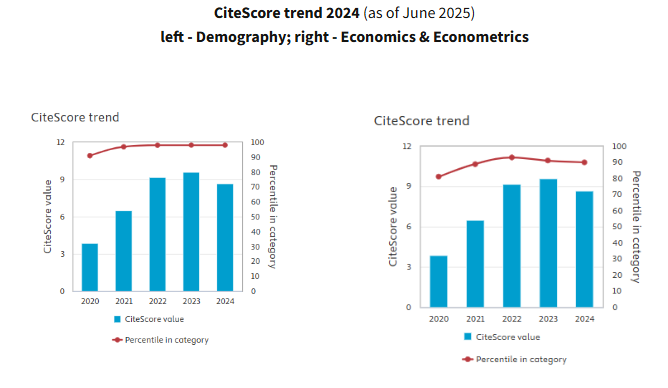

Global Labor Organization (GLO) invites interested young scholars to apply for participation in the 2025-26 GLO Virtual Young Scholars Program (GLO VirtYS). This is the seventh cohort of the successful GLO venture to support career developments of young researchers. It also provides a unique opportunity to interact with the large and very active GLO global research network.
The application deadline is August 15, 2025, 5 PM GMT.
For general information see GLO VirtYS Website.
The 2025–26 GLO Virtual Young Scholars Program (GLO VirtYS) is a 10-month international research and mentoring initiative designed for early-career scholars committed to producing policy-relevant, high-quality academic work. Starting on October 1, 2025, selected participants will join a global cohort as GLO Affiliate and receive individual guidance from thematic cluster advisors, structured feedback on their research, and opportunities to present their findings within the GLO community. Upon successful completion by July 30, 2026, scholars will have the opportunity to submit their work to the GLO Discussion Paper Series and may be considered for appointment as a GLO Fellow.
2025-26 GLO Virtual Young Scholars Program (GLO VirtYS)
About GLO: The Global Labor Organization (GLO) is a global, independent, non-partisan and non-governmental organization that has no institutional position. The GLO functions as an international network and virtual platform for researchers, policy makers, practitioners and the general public interested in scientific research and its policy and societal implications on global labor markets, demographic challenges and human resources. These topics are defined broadly in line with its Mission to embrace the global diversity of labor markets, institutions, and policy challenges, covering advanced economies as well as transition and less developed countries.
Program’s Goal: In the spirit of the GLO Mission, the GLO VirtYS program’s goal is to contribute to the development of the future generation of researchers, who are committed to the creation of policy-relevant research, are well equipped to work in collaboration with policy makers and other stakeholders, and adhere to the highest standards of academic integrity. This goal is achieved through the process of working on a specific research paper within the duration of the program, which is 10 months starting from October 1, 2025.
Program’s Advisory Board:
Program’s Activities:
Research proposals are invited related to any of the GLO Research and Policy Clusters: see Thematic Clusters I and Thematic Clusters II.
Benefits to the GLO VYSP Scholars:
Eligibility criteria:
How to apply: all application materials have to be submitted online. If there are any questions, please write to o.nizalova@kent.ac.uk.
Selection procedure:
The GLO Virtual Young Scholars will be selected by a Scientific Selection Committee consisting of the GLO VirtYS Program Director, GLO thematic cluster leads participating in the current year, and a member of the GLO Management Board.
The results of the selection will be posted on the GLO site www.glabor.org by September 22, 2025. Scholars will be notified via email. In the 2025-26 academic year we expect to select 5-7 scholars.
The final research paper should be submitted by July 30, 2026, by 5 pm GMT.
Upon completion of the program and based on the quality of the produced research paper, some of the GLO VirtYS programme graduates may be invited to become GLO Fellows and their paper accepted as a GLO Discussion Paper.
Evaluation criteria for applications:
Application procedure:
Many applicants apply in the last days before the submission deadline. To avoid last minute problems, we ask applicants to apply in advance. Applications received after the deadline or applications that do not meet the requirements set out below will not be accepted.
To apply please complete the online application form with three attachments:
1. Research proposal (maximum 2 pages including references, single-spaced, font size 12) should include the following information:
• Formulation of the problem/ research question.
• Research methodology (data and empirical approach).
• (Potential) Practical/Policy implications.
• Reference list.
2. 2-page CV
3. Transcript from the doctoral program or doctoral degree certificate
4. Letter of endorsement for the candidate and the research proposal from either one of the GLO fellows or from the administration of one of the GLO supporting institutions reflecting on the potential of the candidate to benefit from the Program and the merits of the research proposal.
Featured image: The-Coherent-Team-on-Unsplash
Ends;
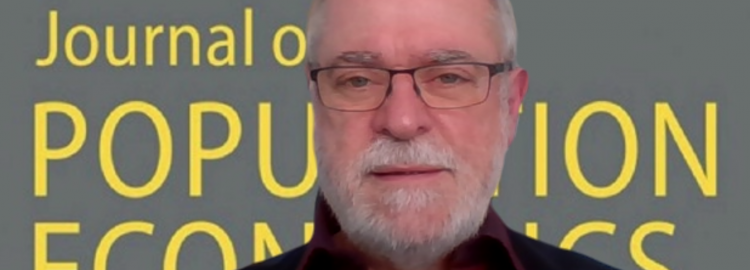
“Dear Klaus F. Zimmermann,
At Springer Nature, we are thrilled to celebrate our exceptional editors like you, whose dedication to your journals and research communities is truly inspiring. Your tireless efforts in developing your journal’s community, supporting your authors and advocating for your communities are invaluable in advancing discovery.
We are proud to honour this remarkable work through the Springer Nature Editor of Distinction Awards, and are delighted to announce that you’ve been selected to receive the following awards:
The Editorial Contribution Award for your contributions to Journal of Population Economics.
The Author Service Award for your contributions to Journal of Population Economics.
The Editor of Distinction awards recognise the outstanding contributions of our editorial community in the following key categories:
– Springer Nature Editorial Contribution Award – This award recognises your meticulous assessment of submissions and rigorous management of the peer review process, safeguarding the scientific accuracy of the published record.
– Springer Nature Author Service Award – This award recognises your exceptional service in improving the author experience and ensuring the peer review process is efficient, constructive and fair.
By rewarding you, we recognise the vital role you play in managing the peer review process and demonstrate our commitment to showcasing these activities. We greatly appreciate the time and expertise you dedicate to helping authors improve their manuscripts and are proud to work with you to build successful journals.
Congratulations and thank you for your dedication to your authors and advancing discovery!
Kind Regards,
Ritu Dhand Ph.D.
Chief Scientific Officer”
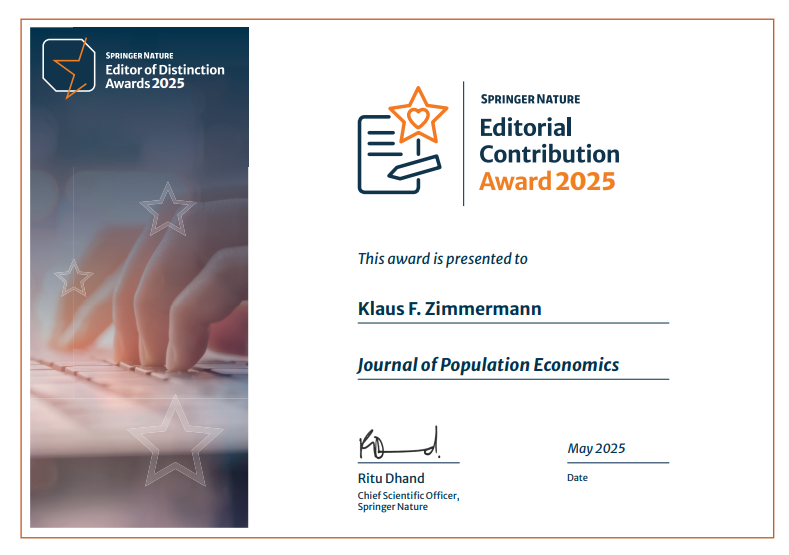


GLO Fellow Martin Kahanec has been appointed Member of the Group of Chief Scientific Advisors to the College of European Commissioners together with six other European scientists across disciplines. For details see LINK. Martin is also a member of the GLO Advisory Board and a long-term research partner of the GLO President, Klaus F. Zimmermann. Congratulations!
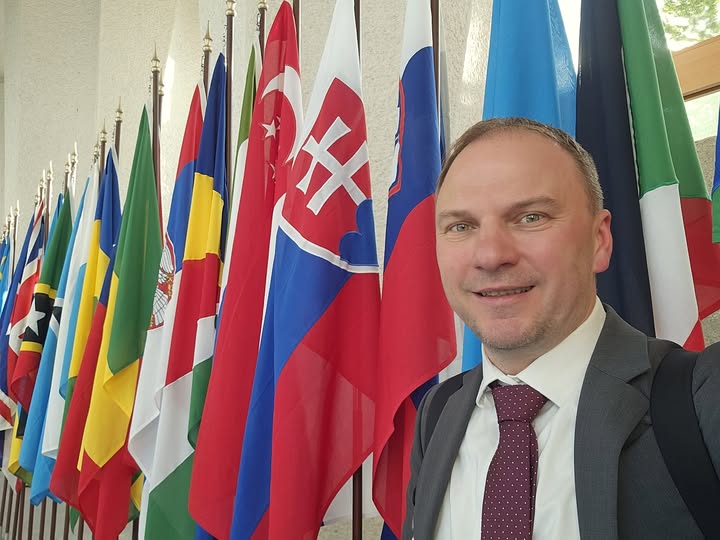
Ends;

New research from the GLO network free to access:
Twenty-four discussion papers from April 2025 on AI & the labor market, youth mental health in a developing country, Jewish occupational attainment, bankruptcies during Covid, gender-specific application, intimate partner violence, Chinese internal migration policies, spatial dependence in Okun’s law, assimilation in the US, arduous jobs & migrants, telecare & elderly mortality, working longer hours, fiscal policies in the eurozone, Ukrainian refugees, childhood maltreatment, regional disparities, compulsory schooling laws, fertility in India, business visits and R&D, endogenous depopulation, informality, interaction effects with panel data, trust & sexual behavior, immigration & partnership dynamics.














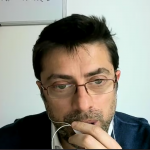





1604 Unequal Impacts of AI on Colombia’s Labor Market: An Analysis of AI Exposure, Wages, and Job Dynamics – Download PDF
by Garcia-Suaza, Andrés & Sarango-Iturralde, Alexander & Caiza-Guamán, Pamela & Gil Díaz, Mateo & Acosta Castillo, Dana
1603 Breaking the Scroll (BTS): A Randomized Controlled Trial Assessing Social Media Use and Youth Mental Health in the Context of a Developing Economy – Download PDF
by Andlib, Zubaria
1602 Jewish occupational attainment in the antebellum United States: Filling a gap in the literature – Download PDF
by Chiswick, Barry R. & Robinson, RaeAnn H.
1601 Bankruptcies during Covid-19 in Italy: An interrupted time-series analysis – Download PDF
by Ferri, Valentina & Gallo, Giovanni & Scicchitano, Sergio
1600 Gender-Specific Application Behaviour, Matching, and the Residual Gender Earnings Gap – Download PDF
by Lochner, Benjamin & Merkl, Christian
1599 The Double-Edged Sword: How Women’s Financial Inclusion Affects Intimate Partner Violence in India – Download PDF
by Shreemoyee, Shreemoyee & Roychowdhury, Punarjit & Dhamija, Gaurav
1598 The Health Impacts of Relaxing Internal Migration Policies: Quasi-experimental Evidence from China – Download PDF
by Wu, Fengyu & Wang, Julia Shu-Huah & You, Jing & Teitler, Julien
1597 Heterogeneity and spatial dependence in Okun’s law: a global view – Download PDF
by Maridueña-Larrea, Ángel & Martín-Román, Ángel & Porras-Arena, Sylvina
1596 A Historical Note on the Assimilation Rates of Foreign-Born Men and Women in the U.S – Download PDF
by Duleep, Harriet & Dowhan, Dan & Liu, Xingfei & Regets, Mark & Gesumaria, Robert
1595 In Europe, Arduous Jobs Fall On First-Generation Migrants. But Later Generations Benefit From Improved Opportunities – Download PDF
by Vandenberghe, Vincent
1594 Telecare and Elderly Mortality: Evidence from Italian Municipalities – Download PDF
by Matteucci, Nicola & Picchio, Matteo & Santolini, Raffaella & Yebetchou Tchounkeu, Rostand Arland
1593 Who Works Longer Hours in Smart Cities? – Download PDF
by Cai, Zhengyu
1592 Austerity and asymmetries in the fiscal policies of the eurozone – Download PDF
by Bajo-Rubio, Oscar & Gómez-Plana, Antonio G.
1591 Self-selection on human capital for Ukrainian refugees in Belgium – Download PDF
by Berlinschi, Ruxanda & Verhaest, Dieter & Poelmans, Eline & Adriaenssens, Stef
1590 Beyond Higher Education: University Establishments and Childhood Maltreatment – Download PDF
by Li, Yanjun & Liu, Xinyan & Tanaka, Ryuichi
1589 Fade into the Shadows: Adjustments in Administrative Divisions and Regional Disparities – Download PDF
by Jie, Yangyang & Zhang, Peikang & Shen, Tiyan
1588 Do Compulsory Schooling Laws Affect Fertility Behaviors and Marriages? Evidence from India – Download PDF
by Bhattacharjee, Sandipa
1587 COVID-19 Lockdowns and Childbirth Delivery Care in India – Download PDF
by Bhattacharjee, Sandipa & Alam, Shamma Adeeb & Bose, Bijetri
1586 The role of business visits in fostering R&D investment – Download PDF
by Vivarelli, Marco & Piva, Mariacristina & Tani, Massimiliano
1585 Endogenous Depopulation And Economic Growth – Download PDF
by Bucci, Alberto & Prettner, Klaus
1584 Marginalized Agency or Agency at the Margins: Domestic Workers and Informality – Download PDF
by Friedman-Sokuler, Naomi & Lavee, Einat
1583 Estimating interaction effects with panel data – Download PDF
by Muris, Chris & Wacker, Konstantin M.
1582 Trust behaviour of sexual minorities: Evidence from a large-scale trust game experiment – Download PDF
by Berlingieri, Francesco & Kovacic, Matija & Stepanova, Elena
1581 Immigration, Partnership Dynamics and Welfare Persistence – Download PDF
by Andrén, Daniela & Andrén, Thomas & Kahanec, Martin
Ends;

The following recent 2025 articles in the Journal of Population Economics are FREE ACCESS within period April 1 – May 31, 2025:
Optimal sequential fertility choices under discriminatory preferences Jianxun Lyu
Does urbanization empower women? Evidence from India Gaurav Dhamija, Punarjit Roychowdhury, Binay Shankar
Brothers, sisters, and support to older parents: separate spheres across and within support types? Christine Ho, Kathleen McGarry
High-speed internet and socioemotional wellbeing in adolescence and youth Karina Colombo, Elisa Failache, Martina Querejeta
Pension reforms, longer working horizons, and absence from work Giorgio Brunello, Maria De Paola, Lorenzo Rocco
The evolution of labor market disparities between Hispanic and non-Hispanic men: 1970–2019 Ioannis Kospentaris, Leslie S. Stratton
The effect of the one-child policy on fertility in China: identification based on difference-in-differences Hongbin Li, Xinzheng Shi
Issue 1 March 2025 Issue 2 June 2025 Journal of Population Economics
Ends;

New research from the GLO network free to access:
Nine discussion papers from March 2025 on the learning crisis in the United States, digital technologies, lasting effects of early-life adverse conditions, reproduction in Ming-Qing Chinese families, dental visits among eligible children, herding and the intention to vaccinate, geography of tourism firm spending, earnings trajectories of second-generation immigrants, and internet and immigrants’ well-being.

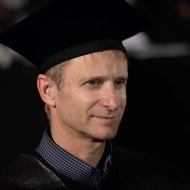

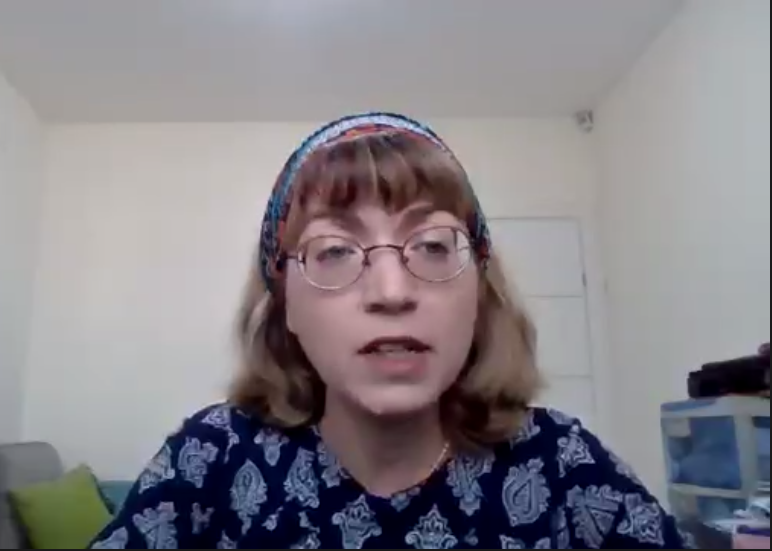


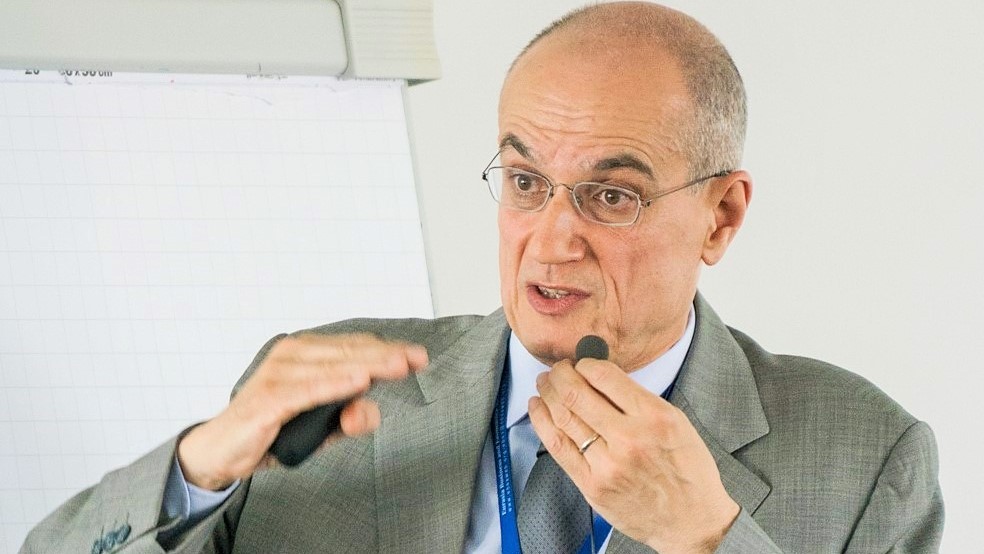

1580 A Twin Transition or a policy flagship? Emergent constellations and dominant blocks in green and digital technologies – Download PDF
by Nelli, Linnea & Virgillito, Maria Enrica & Vivarelli, Marco
1579 Origins and developmental paths of medical conditions from mid-childhood to mid-adolescence in Australia: The early-life adverse conditions and lasting effects – Download PDF
by Lan Nguyen & Connelly, Luke B. & Birch, Stephen & Nguyen, Ha Trong
1578 Herding and the intention to vaccinate against COVID-19 – Download PDF
by Epstein, Gil S. & Heizler, Odelia & Israeli, Osnat
1577 The hidden geography of tourism firm spending: tracking economic leakages with firm-to-firm transactions – Download PDF
by Srhoj, Stjepan & Mikulić, Josip
1576 Educational pathways and earnings trajectories of second-generation immigrants in Australia: New insights from linked census-administrative data – Download PDF
by Ha Trong Nguyen & Zajac, Tomasz & Tomaszewski, Wojtek & Mitrou, Francis
1575 Change in Dental Visits among Eligible Children under the Impact of the Child Dental Benefits Schedule in Australia – Download PDF
by Lan Nguyen & Connelly, Luke B. & Birch, Stephen & Ha Trong Nguyen
1574 The Learning Crisis in the United States Three Years After Covid-19 – Download PDF
by Patrinos, Harry Anthony & Jakubowski, Maciej & Gajderowicz, Tomasz
1573 Home-country Internet and Immigrants’ Well-being – Download PDF
by Yarkin, Alexander
1572 Celebrating legacy: The intergenerational transmission of reproduction and human capital in Ming-Qing Chinese families – Download PDF
by Hu, Sijie
Ends;

New research from the GLO network free to access:
Seventeen discussion papers from February 2025 on democracy in Africa, workplace democracy, assortative mating, violence and markets in the 14th century, math exposure and university performance, new technologies and employment, career break around childbirth, gender and household labor, immigrant labor, self-promotion, climate change and morbidity, health effects of nuclear tests, measuring climate risks, free trade and employment, learning about AI, and occupational skills and the gender wage gap in a developing economy.


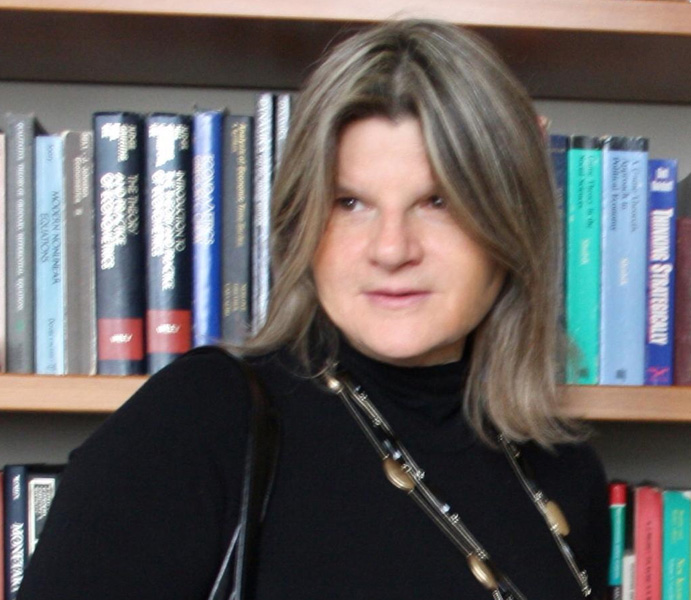


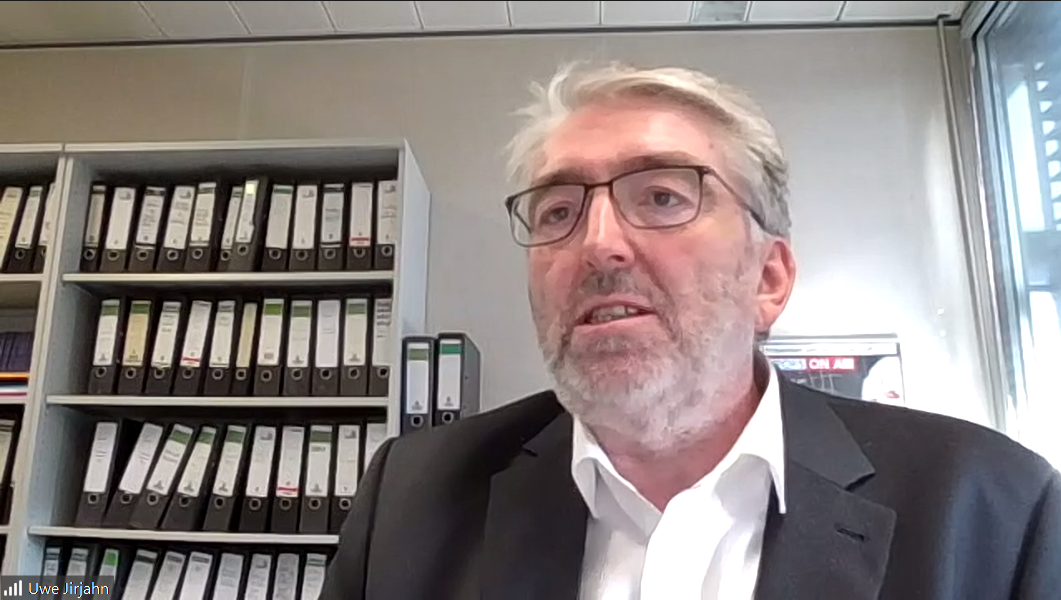

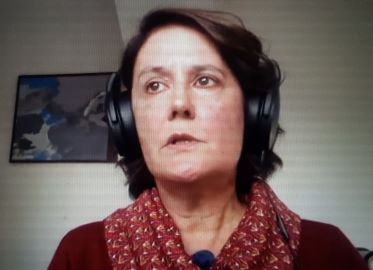


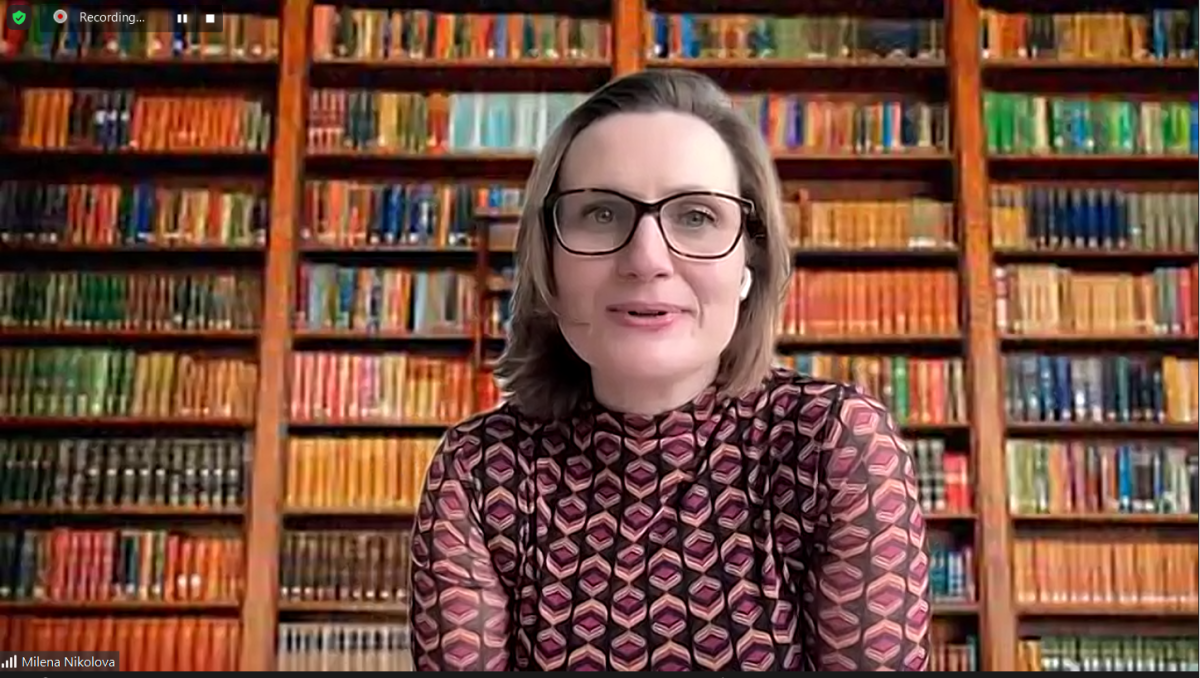





1571 Internet Use and understanding democracy in Africa – Download PDF
by Maurel, Mathilde & Pernet, Thomas
1570 The impact of Next-Generation Broadband: Marriage rates and Assortative mating – Download PDF
by Marcén, Miriam & Morales, Marina
1569 Murder in the Marketplace – Download PDF
by Biagi, Victoria & Cardazzi, Alexander & Porreca, Zachary
1568 Political Spillovers of Worker Representation: With or Without Workplace Democracy? – Download PDF
by Jirjahn, Uwe
1567 Math Exposure And University Performance: Causal Evidence From Twins – Download PDF
by Bertocchi,Graziella & Bonacini, Luca & Joxhe, Majlinda & Pignataro, Giuseppe
1566 Revisiting the Dunning-Kruger effect: composite measures and heterogeneity by gender – Download PDF
by Adamecz, Anna & Ilieva, Radina & Shure, Nikki
1565 New technologies and employment: the state of the art – Download PDF
by Vivarelli, Marco & Arenas Díaz, Guillermo
1564 Career break around childbirth: the role of individual preferences and social norms – Download PDF
by Di Gioacchino, Debora & Ghignoni, Emanuela & Verashchagina, Alina
1563 The post-COVID-19 gender gap in the division of household labor – Download PDF
by Marcén, Miriam & Morales, Marina
1562 Under Pressure: Trade Competition from Low-Wage Countries and Demand for Immigrant Labor in Italy – Download PDF
by Caselli, Mauro & Traverso, Silvio
1561 Big-up yourself! The Return to Self-Promotion – Download PDF
by Mavisakalyan, Astghik & Palmer, Michael & Salazar, Silvia
1560 Heterogenous impacts of climate change on morbidity – Download PDF
by Hajdu, Tamás
1559 Long-Term Health Effects of Nuclear Tests: The Semipalatinsk Case – Download PDF
by Kuralbayeva, Karlygash & Rienzo, Cinzia & Wong, Po Yin & Guerrero-Serdan, Gaby
1558 Measuring Climate Risks: A New Multidimensional Index for Global Vulnerability and Resilience – Download PDF
by Edmonds, Heidi & Fajardo-Gonzalez, Johanna & Lovell, Julie & Lovell, C.A. Knox
1557 Free Trade Agreement (FTA) and Employment – Download PDF
by Chowdhury, Sumit & Marjit, Sugata & Das, Gouranga
1556 The Impact of Learning about AI Advancements on Trust – Download PDF
by Nikolova, Milena & Angrisani, Marco
1555 Can occupational skills explain the gender wage gap in a developing economy? An unconditional quintile regression approach – Download PDF
by Andlib, Zubaria
Ends;

The 51st EBES Conference – Rome will take place on April 11th, 12th, and 13th, 2025 in Rome, Italy. The conference will be hosted by John Cabot University with the support of the Istanbul Economic Research Association and is organized in Hybrid Mode (online and in-person). Interested researchers from around the world are cordially invited to submit their abstracts or papers for presentation considerations.
The conference aims to bring together many distinguished researchers from all over the world. Participants will find opportunities for presenting new research, exchanging information, and discussing current issues. Although we focus on Europe and Asia, all papers from major economics, finance, and business fields – theoretical or empirical – are highly encouraged.
Deadline for Abstract/Paper submission is March 10, 2025.

Featured image: david-kohler-VFRTXGw1VjU-unsplash
Prof. Klaus F. Zimmermann, UNU-MERIT, Maastricht, and Free University Berlin, Germany
Prof. Mehmet Huseyin Bilgin, Istanbul Medeniyet University, EBES, Turkey
Prof. Jonathan Batten, University Utara Malaysia, Malaysia
Prof. Iftekhar Hasan, Fordham University, U.S.A.
Prof. Euston Quah, Nanyang Technological University, Singapore
Prof. John Rust, Georgetown University, U.S.A.
Prof. Dorothea Schäfer, German Institute for Economic Research DIW Berlin, Germany
Prof. Marco Vivarelli, Università Cattolica Del Sacro Cuore, Italy
Authors are invited to submit their abstracts or papers no later than March 10, 2025.
For submission, please visit our website at
at https://ebesweb.org/51st-ebes-conference-rome/51st-abstract-submission/
no submission fee is required.
General inquiries regarding the call for papers should be directed to ebes@ebesweb.org
Qualified papers will be published in EBES journals (Eurasian Business Review and Eurasian Economic Review) after a peer review process without any submission or publication fees. EBES journals (EABR and EAER) are published by Springer and both are indexed in the SCOPUS, EBSCO EconLit with Full Text, Google Scholar, ABS Academic Journal Quality Guide, CNKI, EBSCO Business Source, EBSCO Discovery Service, ProQuest International Bibliography of the Social Sciences (IBSS), OCLC WorldCat Discovery Service, ProQuest ABI/INFORM, ProQuest Business Premium Collection, ProQuest Central, ProQuest Turkey Database, ProQuest-ExLibris Primo, ProQuest-ExLibris Summon, Research Papers in Economics (RePEc), Institute of Scientific and Technical Information of China, Naver, SCImago, ABDC Journal Quality List, Cabell’s Directory, and Ulrich’s Periodicals Directory. In addition, while EAER is indexed in the Emerging Sources Citation Index (Clarivate Analytics), EABR is indexed in the Social Science Citation Index (SSCI) and Current Contents / Social & Behavioral Sciences.
Also, all accepted abstracts will be published electronically in the Conference Program and the Abstract Book (with an ISBN number). It will be distributed to all conference participants at the conference via USB. Although submitting full papers are not required, all the submitted full papers will also be included in the conference proceedings in the USB.
After the conference, participants will also have the opportunity to send their paper to be published (after a refereeing process managed by EBES) in the Springer’s series Eurasian Studies in Business and Economics (no submission and publication fees). This is indexed by Scopus. It will also be sent to Clarivate Analytics in order to be reviewed for coverage in the Conference Proceedings Citation Index – Social Science & Humanities (CPCI-SSH). Please note that the 10th, 11th, 12th, 13th, 14th, 15th, 16th, 17th, 18th, 19th, 20th, 21st, 22nd, 23rd, 24th, 25th, 26th & 27th, 28th, 29 (Vol. 1), and 30th EBES Conference Proceedings are accepted for inclusion in the Conference Proceedings Citation Index – Social Science & Humanities (CPCI-SSH). Other conference proceedings are in progress.
Conference Date: April 11-13, 2025
Abstract Submission Deadline: March 10, 2025
Reply-by: March 15, 2025 *
Registration Deadline: March 20, 2025
Submission of the Virtual Presentation: March 21, 2025
Announcement of the Program: March 27, 2025
Paper Submission Deadline (Optional): March 21, 2025**
Paper Submission for the EBES journals: July 15, 2025
* The decision regarding the acceptance/rejection of each abstract/paper will be communicated with the corresponding author within a week of submission.
** Completed paper submission is optional. If you want to be considered for the Best Paper Award or your full paper to be included in the conference proceedings in the USB, after submitting your abstract before March 10, 2025, you must also submit your completed (full) paper by March 21, 2025.
Ugur Can, Director of EBES (ebes@ebesweb.org)
Dr. Ender Demir, Conference Coordinator of EBES (demir@ebesweb.org)
Conference LINK
Ends;

New research from the GLO network free to access:
Eight Discussion Papers from January 2025 on service market liberalization, retirement decisions, wage subsidies for low-paid workers, loneliness, unions in Sub-Saharan Africa, labor adjustment costs, family-owned business, and economic literacy.








1554 Deregulation Derailed: Evidence from Services Markets Liberalization in Croatia – Download PDF
by Grajzl, Peter & Ćorić, Bruno & Srhoj, Stjepan
1553 Retirement Decisions in the Age of COVID-19 pandemic: Are Older Employees in Digital Occupations Working Longer? – Download PDF
by Gallo, Giovanni & Nagore García, Amparo
1552 Bridging the wage gap: A discussion of wage subsidies to low-paid workers and their costs in Italy – Download PDF
by Bonatti, Luigi & Lorenzetti, Lorenza Alexandra & Traverso, Silvio
1551 Social media use, loneliness and emotional distress among young people in Europe – Download PDF
by Cabeza Martínez, Begoña & D’Hombres, Beatrice & Kovacic, Matija
1550 Unions and Collective Bargaining in Sub-Saharan Africa: Some Insights from Quantitative Studies – Download PDF
by Jirjahn, Uwe
1549 Productivity Labour Adjustment Costs. How do new hires and leavers (incl. retirees) compare? – Download PDF
by Vandenberghe, Vincent
1548 How Credit Constrained are Family-Owned SMEs in Arab Countries? – Download PDF
by Gourène, Grakolet & Brixiova Schwidrowski, Zuzana & Balcar, Jiří & Johnson Filipova, Lenka
1547 Enhancing Economic Literacy through Causal Diagrams – Download PDF
by Pavlov, Oleg V. & Smirnova, Natalia V. & Smirnova, Elena V.
Ends;
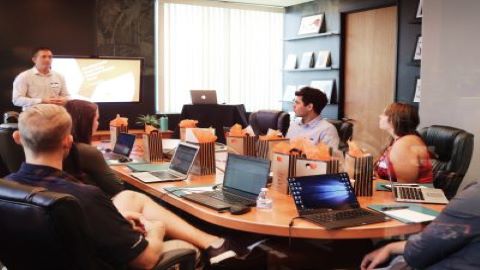
GLO Virtual Young Scholar (VirtYS) program session: Part II of the 2023-24 Cohort final presentations on January 23, 2025, 1-2 pm London/UK time
To register asap for the Zoom meeting: https://us02web.zoom.us/meeting/register/vTP3qExMS9GlbbggasrPmw
You will receive a code for logging in after registration.
Chair: Klaus F. Zimmermann
Each paper 15 min presentation and 5 min Q&A.
Note: Featured image Unsplash
Vincent Jerald Ramos
He is a Research Fellow at the University of Southampton, working on the demographic consequences of employment uncertainty. Concurrently, he is leading projects on concentration, representation, and bargaining in Philippine labor markets and the consequences of restrictive covenants in employment contracts. His work has been published in Work, Employment and Society, European Journal of Population, and Industrial Relations Journal, among others. He holds a PhD (summa cum laude) from the Hertie School Berlin and his current areas of interests are labor and economic demography and labor market institutions
Personal website: https://vincentrramos.github.io/
Presentation title: Too Little, Too Weak? Paid Parental Leaves and Workers’ Bargaining Response
Abstract: When statutory work and family entitlements are deemed insufficient, how do workers respond and compensate? Looking at some advanced economies points us to an idea – unionization may secure better conditions and higher benefit entitlements than what is statutorily guaranteed. However, the universality of this “success story” is far from established, particularly in contexts where unions play a less salient role and parental leave laws are perceived as weakly enforced, as is the case in many developing countries. In this paper, we construct a novel dataset of all private sector collective bargaining agreements (CBAs) in the Philippines from 2016-2021 to: (i) descriptively show the prevalence of paid parental leaves (PPLs) in CBAs; (ii) assess whether wage increase provisions crowd-out PPLs in CBAs; and (iii) analyze the causal effect of a 2019 maternity leave reform, which increased leave entitlement from 8 to 15 weeks, on the inclusion of PPLs in CBAs using two quasi-experimental identification strategies. Results suggest that around 65% of CBAs contain reinforcing provisions that merely restate statutory leave entitlements, while only 5% contain augmenting provisions that secure more leaves. Meanwhile, we find no evidence that either the inclusion of wage increase provisions or the 2019 reform has crowded out PPL provisions. On the contrary, we find a crowding-in pattern – wage increase provisions at the extensive and intensive margin are associated with a higher probability of PPL inclusion. Unpacking potential mechanisms, semi-structured interviews with union leaders and negotiators lend support to a bounded augmentation hypothesis such that where compliance and enforcement of family policy laws are perceived as weak, redundancy is as much of an objective as augmentation is in collective bargaining.
Xinyan Liu
She is a research associate at the University of Tokyo. She is a GLO Virtual Young Scholar in the 2023-24 cohort. She obtained her Ph.D. degree from the Chinese University of Hong Kong in 2024.
Her research interests span the fields of labor economics, education economics and crime economics. In particular, she focuses on three key areas: the influence of governmental policies on labor markets, education, and crime outcomes; the long-term effects of early childhood development; and the impact of policies on gender violence and its consequences.
Personal website: https://sites.google.com/view/liuxinyan/home
Presentation title: Institution Matters: University Establishments and Childhood Maltreatment
Abstract: The prevalence of violence against children is a global concern, and addressing this urgent issue requires serious consideration. Based on the evidence from child trafficking, which is recognized as one of the most severe forms of childhood maltreatment, this paper proposes that the establishment of nearby educational institutions could have a substantial impact on reducing violence against children. Exploiting a quasi-experiment in China that exogenously led to the establishment of more campuses in 1999, this study investigates that the university establishments can lead to a decrease in the number of missing children. Our mechanism demonstrates that the university’s establishment leads to improved economic development, increased public safety, and changes in family behavior, resulting in a reduction in criminal activities. Our findings reveal the unintended effects on children following the implementation of social facilities, which can serve as a hidden means to combat violence against them.
Robina Kouser
She is a PhD scholar at the National University of Sciences and Technology. She is a GLO Virtual Young Scholar in the 2022-23 cohort. She is entitled to an AAEA Uma LELE mentor fellowship in 2023. Recently, she has been visiting Texas A&M University USA, as a visiting research fellow. She is working on food insecurity and the labor market in the context of households with persons with disability (PWD). Her areas of interest are the economics of inequality, labor market, and development economics.
Presentation Title: A New Insight into the Measurement of Household Well-Being for Vulnerable Economies: Evidence Using Pakistan’s Labor and Diet Data.
Abstract: Well-being is a multidimensional concept that includes various aspects of life, such as physical, emotional, and social well-being. Indexes like the Human Development Index and the Multidimensional Poverty Index are popular global measures of well-being that use indicators like education, health, and living standards. Food insecurity and lack of decent work are two key factors that significantly contribute to the deprivation of household well-being. Lack of decent work leads to low wages, long working hours, unsafe work environments, and other factors that can negatively impact the workers’ physical and mental health. Similarly, food insecurity is associated with malnutrition, poor health outcomes, and a reduced quality of life. We construct a novel index to incorporate the dimensions of labor and diets. Using the nationally representative PSLM/HIES (2018–19) data, we build a multi-dimensional well-being index (MWBI) for different occupational groups in Pakistan. We use the Alkire and Foster methodology to find the deprivation of well-being across regions, provinces, sectors, PSCO-major classes, skill levels, and industries. Our findings reveal that 26 percent of the households perform poorly on multi-dimensional well-being. Rural areas are twice as deprived as urban areas. KPK province is the most deprived, while Punjab is the least. Female-headed households are worse off than male-headed households. Household heads employed in the agriculture sector, working in PSCO-class ‘elementary occupations,’ possessing skill level 1, or in the arts, entertainment, and recreation industry are the worst performers. Household heads employed in the non-agriculture sector (0.23), PSCO major group of clerical support workers (0.08), possessing skill level 4 (0.11), or in the industry of real estate are the least deprived. Our policy recommendations are to ensure wages exceed the minimum wage and promote skilled work. Focusing on the interplay of labor and diet is pivotal to promoting well-being in vulnerable economies.

GLO Fellow Richard A. Easterlin (University of Southern California), the intellectual giant of population economics, passed away at the age of 98 on December 16, 2024. Population economists will miss his spirit, inspiration, support, and friendship.

The Easterlin hypothesis is a theory of fertility preference formation, which suggests that fertility cycles depend on the changing aspirations of young people and intergenerational relative income across cohorts. The economic and social outcomes of a cohort are inversely correlated to its size. Easterlin attributes this to material aspirations formed during adolescence using parents’ economic outcomes as a benchmark. Large cohorts growing up in prosperous times develop high income aspirations, facing poorer prospects due to crowding in family, education, and labor markets. Larger cohorts often result in more siblings, thus diluting parental time and resources. Entry of large cohorts into the labor market leads to lower relative wages and higher unemployment. Consequently, such cohorts feel deprived and may exhibit lower birth rates, leading to smaller succeeding cohorts with lower material aspirations. This cohort size effect generates long-term fertility trends and shifts in labor and goods markets.
The Easterlin paradox explains why, contrary to expectations, happiness at the national level does not necessarily increase with income over time. While cross-sectional analyses within countries show that higher income correlates with greater happiness, time-series analyses reveal that economic growth does not necessarily increase happiness. Comparatively, when basic needs, such as clothing, nutrition, and housing are met, national income has little impact on happiness. Easterlin suggested that relative income and aspiration processes explain this paradox. Once basic needs are satisfied, further increases in absolute income do not enhance well-being, unless they improve one’s relative societal position. Additionally, a higher income often raises income and consumption aspirations.
Dick Easterlin has been an author (see (9) below) and long-term Associate Editor of the Journal of Population Economics. He has been the only person in the history of the journal who was honored by an interview (see (8) below with free PDF access). Over the decades, a huge amount of research related to his work has been published in the journal (see (6) and (7) as examples below).
Research by Richard Easterlin and Gary Becker were the major sources in my population economics class in my time as Associate Professor at the University of Pennsylvania in 1987.
During my tenure as Founding Director of IZA, I was chairing the IZA award committee deciding to honor Easterlin with the IZA Prize in 2009 and was co-editing his Oxford University Press prize book (see (4) and (5) below). The official 2009 IZA Prize Ceremony took place on October 22 in Washington, DC, where I met him last time in person. I remember the moving celebrations well.
The Journal of Population Economics has established a special collection of work on Wellbeing and Happiness and the Springer Nature Handbook of Labor, Human Resources and Population Economics has an own section on Welfare, Well-Being, Happiness to publish work in his tradition (see (2) and (3) below).
In 2022, Dick Easterlin co-authored a chapter on The Easterlin Paradox in the Handbook of Labor, Human Resources and Population Economics (see (1) below with free PDF access). This paper was GLO Discussion Paper No. 743, 2020.
With tremendous respect, we will always remember his path-breaking work and great personality.
Klaus F. Zimmermann
References:
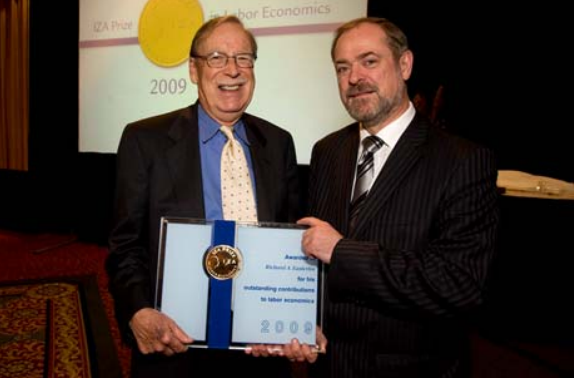
Source: Richard Easterlin receives IZA Prize in Labor Economics. Journal of Population Economics (2010) 23:411–414. DOI 10.1007/s00148-009-0301-4, p. 411.